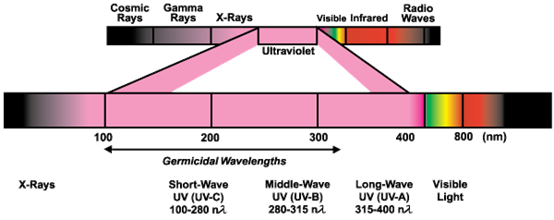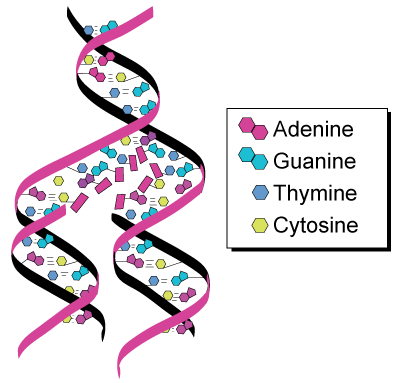
What is ultraviolet?
Ultraviolet light is part of the light spectrum, which is classified into three wavelength ranges:
UV-A, from 315 nm to 400 nm

Effective But Dangerous.
The sun produces a spectrum of UV light. UV-A makes up the vast majority of the UV radiation reaching Earth and can penetrate deep into skin, causing aging such as wrinkles and age spots. UV-B more deeply damages the DNA in skin, leading to sunburn and eventually skin cancer.
But the UV-C is much more dangerous to all genetic material. It’s a germicide, which means it can kill up to 99.99 per cent of bacteria and viruses. The UV-C emitted by the sun is stopped by the ozone layer, so we aren’t directly exposed to it.
How does germicidal ultraviolet work?
UV-C light is germicidal., it deactivates the DNA of bacteria, virus and other pathogens and thus destroys their ability to multiply and cause disease. Specifically, UV-C light causes damage to the nucleic acid of microorganisms by forming covalent bonds between certain adjacent bases in the DNA. The formation of such bonds prevent the DNA from being unzipped for replication, and the organism is unable to reproduce. In fact, when the organism tries to replicate, it dies.

Can UV light kill the coronavirus?
The National Academies of Sciences, Engineering and Medicine reported that ultraviolet light probably can kill the coronavirus. "UV light has been shown to destroy other coronaviruses, so it will probably work on the novel coronavirus," the website reads. This includes the deadly Middle Eastern respiratory syndrome coronavirus, aka MERS-CoV and severe acute respiratory syndrome-related coronavirus, or SARS.
But like we said, UV-C light is dangerous, we need use it carefully, the WHO also echoes this, reporting on its coronavirus myth-busters webpage that people should not use UV lamps to disinfect their hands or other areas of skin, as UV radiation "can cause skin irritation and damage your eyes."